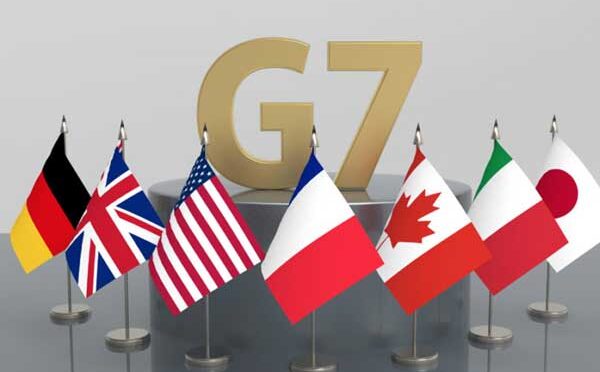Asian rhetoric in the G-7 Summit in Cornwall
Posted on : August 16, 2021Author : Ankita Chatterjee

Claiming to represent the world’s most stable, prosperous, and liberal democracies, the G7 is an inter-governmental political forum comprising the world’s seven largest advanced economies. The 47th G7 summit was held from 11th to 13th June 2021 in Cornwall, England. This summit brought together the G7 leaders – Canada, France, Germany, Italy, Japan, the UK, and the US. In addition to this, representatives from the European Union, India, South Korea, South Africa and Australia were also invited as guest countries.The overarching theme of the summit this time was “Build Back Better World” (B3W) initiative—the plan to recover from the pandemic and also to counter China’s “Belt Road Initiative” (BRI). The Coronavirus, the climate crisis and countering China’s aggression were the crux of the discussion in the summit. More importantly, in a landmark agreement, the G7 leaders have generously pledged to donate nearly 1 billion COVID-19 vaccine doses internationally, especially to the developing and poorer countries in South America, Asia and Africa, thereby endorsing support for equitable global access to vaccination.
This time the summit’s communique was pertinent to Asia. Particularly significant was the announcement of a global infrastructure plan with an aim to give developing countries an alternative to doing business with China through its Belt and Road Initiative which is seen by many as a “debt trap”. The G7 agreed to offer funds that will provide a transparent infrastructure partnership to help narrow the $40 trillion needed by developing nations by 2035. In addition to this, the summit declared a financial pledge of US$100 billion to fund the annual climate budget for the developing world. The UK Prime Minister Boris Johnson expressed the responsibility of the developed countries to help developing countries equally receive the benefits of green growth, which is a shift toward renewable energy powered by advanced technology. This ambition aligns closely with the policies of the governments of South Korea and Japan, who hope that their MNCs will benefit from a surge in green investment. The summit also provided a platform for Japan and France to get nearer to each other. They both agreed on closer cooperation in security, technology, and North Korea. Moreover, Japan welcomed France’s stronger engagement in the Indo-Pacific region. Also, The U.S. Secretary of State Antony Blinken had a meeting with South Korea’s Foreign Minister Chung Eui-yong, in which they reaffirmed commitment to close and stronger cooperation between and among the United States, the Republic of Korea, and Japan on a broad array of issues.
Indian Prime Minister Narendra Modi, one of the chief guests invited to the summit, called for a “one earth, one health” approach which aims for unity and solidarity among the states of the world to deal with the pandemic. Prime Minister Modi also called for smoothing of supply chains for vaccine raw materials and stressed vaccines’ patent waiver which was backed by several G7 leaders.
China, though neither a member of the G7 nor invited to the summit, had a profound impact on the summit. The Canadian Prime Minister Justin Trudeau led a discussion at the G7 Summit on the need to build a consensus on a unified approach to the challenges that China presents to the world.
There was a further challenge to China when the G-7 leaders were joined by Dr. Tedros Adhanom Ghebreyesus, the director general of the World Health Organization (WHO). He emphasised the U.S. and Australian demands for further investigation into claims that the COVID-19 virus may have emerged from a laboratory in Wuhan. He also urged the leaders at the meeting to ensure that 70 percent of the global population is vaccinated by the time of the G-7’s next summit in Germany next year in 2022. The Prime Minister of Japan, Yoshihide Suga is leading the drive to persuade wealthy countries to fund the COVAX vaccine program, administered by the WHO, to counterbalance China’s vaccine diplomacy. The summit’s communique also called on China to respect human rights and fundamental freedoms, especially in relation to genocide and crimes against humanity in Xinjiang and pressed for a high degree of autonomy for Hong Kong as well.
Furthermore, the democracy-crisis in Myanmar also drew the attention of the G7 leaders. The G7 leaders vehemently condemned the military coup in Myanmar and the subsequent violence inflicted by the junta on the civilians, calling for the immediate release of those detained arbitrarily including leader Aung San Suu Kyi. In addition to this, the G7 leaders welcomed ASEAN’s Five-Point consensus which was formulated to tackle the political crisis in Myanmar and called for an unfettered humanitarian access to the vulnerable and displaced populations in the country.
Evidently, Asia and Asian issues had occupied a large portion of the discussion at the summit this time. This was a summit at which international cooperation was re-launched. The US President Joe Biden seized this opportunity to reassert U.S. leadership in the democratic world and to promote transatlantic cooperation. The world’s seven wealthiest democracies have committed to a new plan to stop future pandemics and to create a greener, more prosperous future with the US-backed “build back better for the world” (B3W) initiative.
References
1] Duncan Barlett, “What the G-7 Summit in Cornwall Means for Asia”, The Diplomat, june 15, 2021
https://thediplomat.com/2021/06/what-the-g-7-summit-in-cornwall-means-for-asia/
2] David Vines,“The G7 suns its Cornwall Consensus”, East Asia Forum,17 June 2021
https://www.eastasiaforum.org/2021/06/17/the-g7-suns-its-cornwall-consensus/
3] G7 summit, Cornwall, UK, European, 11-13 June 2021
https://www.consilium.europa.eu/en/meetings/international-summit/2021/06/11-13/
4] Harry G. Broadman, “Xi Jinping, Although Not In Cornwall, Had A Profound Impact On The G7 Summit”, Forbes, june 30, 2021
5] Kunal Gaurav ,”Trudeau leads G7 discussion on China challenge, pushes for unified approach”, Hindustan Times, June 13, 2021
Ankita Chatterjee
Intern, Asia in Global Affairs





Leave a Reply